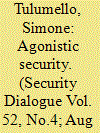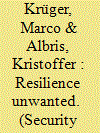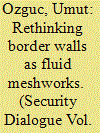| Srl | Item |
| 1 |
ID:
180209


|
|
|
|
|
| Summary/Abstract |
This article aims to contribute toward transcending the dichotomy between deconstruction and reconstruction in critical security studies. In the first part, I review dominant (Western/liberal) logics of security and the main strands of critical security studies to argue that there is a need to overcome the liberal framework of the balance between rights and freedom, with its inherent imbrication with the fantasy of absolute security; and, contra the ultimate conclusions of deconstructive critique, at the same time to take the desire for security seriously. By advocating in favor of embracing the tensions that surface at the intersection of these two conclusions, I then move to my reconstructive endeavor. I set out a meta-theory – that of agonistic security – that is both analytical and normative in nature and inspired by the political theory developed by Mouffe and Laclau. Building on the opposition between antagonism and agonism, I argue that security belongs to the ‘political’ and that it constitutes a field of struggle for politicization. I then argue for three conceptual shifts that concretely define agonistic security: (i) from an absolute/static to a relational/dynamic understanding of security; (ii) from universalism to pluralism at a world scale; and (iii) from the dominance of individual rights in Western/liberal thinking toward an understanding of security as a collective endeavor. In conclusion, I take a step back and discuss the implications of agonistic security for the role of critique in security studies.
|
|
|
|
|
|
|
|
|
|
|
|
|
|
|
|
| 2 |
ID:
180208


|
|
|
|
|
| Summary/Abstract |
Contemporary liberal and democratic states have ‘securitized’ a growing number of issues by advancing the notion of societal security. This is coupled with a proactive stance and the conception of building societal resilience in order to withstand future crises and disturbances. The preemptive logic of contemporary security and crisis management calls for a new type of resilient neoliberal subject who is willing to accept uncertainty and shoulder greater individual responsibility for her own security. This article offers a genealogical analysis of this development in Sweden since the end of the Cold War, highlighting the role now assigned to citizens within social and national security planning. I argue that seeking a return to a more traditional notion of ‘total defence’ blurs the previously important war/peace and crisis/security distinctions. While war preparedness in previous eras was an exceptional aspect of human life and citizenship, the conceptions of security now evolving bind together societal and national security such that civil and war preparedness are merged into an ever-present dimension of everyday existence. The analysis also reveals that the responsibilization of individuals introduces a moral dimension into security and generates new forms of citizen–citizen relations. These extricate the sovereign powers of the state and the liberalist social contract between the state and its citizens.
|
|
|
|
|
|
|
|
|
|
|
|
|
|
|
|
| 3 |
ID:
180211


|
|
|
|
|
| Summary/Abstract |
Villains need to be de-villainized for talking to begin; this is a cornerstone of negotiation literature. But what happens when villains are proscribed, or listed as terrorists? While an emerging body of work has started to explore the effects of proscription by emphasizing aspects of demonization and banishment, it has not so far explored how banishment ends. This article offers a theoretical and empirical contribution to this discussion by exploring the effects of proscription on the dynamic interaction between conflict parties and how negotiations still do take place with armed groups listed as terrorists. To do this it maps representations made by the Colombian government and the Revolutionary Armed Forces of Colombia through a qualitative discourse analysis of 335 statements triangulated with 50 personal interviews. The article argues that proscription makes the initiation of negotiations impossible because it leads to a form of extreme vilification. This is especially true for the government, unable to switch directly to de-vilifying its proscribed enemy. First it has to normalize its vilification – a concept I describe here as a ‘linguistic ceasefire’. This helps explain how banishment can end and peace negotiations can be initiated in an age of proscription.
|
|
|
|
|
|
|
|
|
|
|
|
|
|
|
|
| 4 |
ID:
180210


|
|
|
|
|
| Summary/Abstract |
This article conceptualizes resilience as an emergent and contingent practice that shapes societal relationships in unexpected ways. It focuses on the case of the 2013 floods in Dresden, a city that witnessed three major floods within 11 years. Emergent volunteer activities on the ground and on social media played a significant role during the flood emergency response efforts. Drawing on Philippe Bourbeau’s definition of resilience as a process of patterned adjustment, the article regards these emergent structures as incidents of resilience. In the case of Dresden, not only was resilience not explicitly requested by the state, but it was in several incidents actively not wanted. While most of the volunteering activities arising from social media platforms intended to support the disaster management authorities, the case shows how subversive forms of resilience were mobilized to resist official plans. They finally urged authorities to adapt to a new social and technological reality in order to render unaffiliated volunteering governable. Resilience thus emerges as an adaptive process that shapes and is shaped by societal relations. The article thus seeks to add another facet to the debate on resilience by demonstrating how resilience helps us to make sense of complex and interdependent adaptation processes.
|
|
|
|
|
|
|
|
|
|
|
|
|
|
|
|
| 5 |
ID:
180207


|
|
|
|
|
| Summary/Abstract |
We tend to see border walls as stable concrete fortifications. This article seeks to offer an alternative understanding of walls by suggesting a shift in border studies from network thinking to meshwork thinking. Despite references to multiplicity, concepts of networks and assemblages in border studies continue to provide neat narratives of walls. This article reimagines the border beyond sovereign–disciplinary–biopolitical networks and assemblages. It argues that border walls are constituted by and constitutive of the ever-shifting transformative movements of lines: colonizing lines, crack lines and lines of flight. By tracing the lines of the Separation Wall in the West Bank, this article reveals that, on the border, all these lines coexist, entangle with one another, and in their entanglements, they alter each other to form a fluid meshwork. Meshwork thinking shows the constant mobility of the border and shifts our attention to the power of molecular movements beneath the state in creating, sustaining and disrupting power politics. By presenting a less state-centric, more complex picture of the Separation Wall, this article aims to highlight the movement of the lines that transform the border into a meshwork.
|
|
|
|
|
|
|
|
|
|
|
|
|
|
|
|